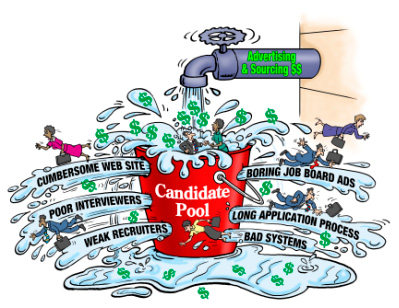I ran across the graphic in this posting a few weeks ago and thought it did a great job of describing the reality of the job hunting experience for most people. The posting was in a newsletter sent out by Electronic Recruiting Exchange (ERE). Here is a link to that newsletter if you care to read it.
 This image came to mind after receiving an email from a person in my professional network who is currently job hunting. I had sent her a note earlier in the week asking her how things are progressing.
This image came to mind after receiving an email from a person in my professional network who is currently job hunting. I had sent her a note earlier in the week asking her how things are progressing.
“Still looking and sending out tons of resumes and applying to jobs. It is so hard. I just don’t understand it. There are so many jobs posted, but they take forever to get back to me. I received a call yesterday from [a major insurance company you’d recognize] that I applied for 2 months ago!”
If you’re one of the 13 million people looking for work right now, you probably have experienced similar frustrations. As the graphic suggests, you’re not imagining things.
Most companies are pathetic at hiring. It is bad enough that there is a huge amount of inefficiencies (the wasted money could be used to pay the wages of more people), but it is even more disappointing to realize that the candidates are the ones who suffer the most.
Unfortunately, this is reality, and it is not going to change in the near future. Is there anything you can do to make the most of this reality? I think so. Here are a few ideas:
1. Adjust your expectations. If you’re responding to job openings posted by companies, expect delays, poor communication, mishandled paperwork, and other problems. It doesn’t matter who you are or how qualified you are for a position; companies will still botch the hiring process. People experience disappointment, discouragement, and even a sense of despair when expectations do not match reality. Lower your expectations.
2. Remember, it’s a numbers game. If your hope is to see one perfect job posting, send the prospective employer a resume, and then get hired; what happens when thing don’t work out? You’re devastated. What if you’re working on 20 different opportunities and one doesn’t work out? You still have 19 more opportunities. Concentrate most of your efforts on keeping the opportunity bucket full. Something will eventually work out.
3. Sidestep the hiring system. If companies are going to screw up the hiring process, maybe you should sidestep the process all together. There are career gurus who espouse the benefits of looking for a job outside traditional techniques. The most notable is Richard Bolles, but there are many others, as well. Some of these techniques are worth investigating because they acknowledge that the system is broken and provide solutions from this premise.
Tomorrow, I’ll cover one of these techniques in detail.

